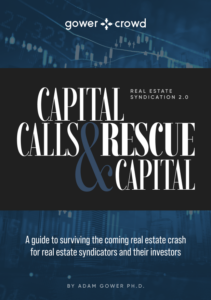Real Estate Investors Want to Hear Your Story, Not Your Data
By Adam Gower Ph.D.
When you’re reaching out to new investors, accredited or not, you need the right approach to get them interested in what you’re offering. It’s tempting to lead with projected internal rates of return, returns on investment, market comparisons, and other data that makes your project look good.
But, if you really want to drive decision-making and attract interest, you need to lead with your story instead of your data.
How We Make Decisions
As much as we like to think we make decisions based on data and logical evidence, the majority of our decision-making still revolves around our gut feeling, emotions, and similar subconscious processes. Evidence may play into our decisions, but we always start with emotion.
Before we had access to great data, all we had were stories. You can develop impressions about a project and learn what’s under the surface through the stories the people representing that project tell you. The numbers can increase interest, but by themselves they’re unlikely to be convincing enough to make an investor buy in. What brings buy-in? The right stories.
Data Vs. Anecdotes
Data is a great resource for your business. You can use it to drive many different internal decisions and to back up your external case with evidence. It plays a huge role in your marketing and outreach, but by itself data is nothing but a collection of numbers.
Anecdotal stories give context to data. Stories from your own experience or from the company’s experience show what’s happening around the numbers and demonstrate that you have the competence to interpret the numbers, read the market, and drive your project to success.
Put yourself in the shoes of your investors. What’s going to drive you to put money into one real estate project over another? Would slightly better numbers convince you, or would you be more convinced by a project sponsor who can tell you all about how they successfully navigated out of a tricky economic issue with their last project? Anecdotes and personal stories earn more trust than numbers, and trust wins investors in the end.
Selling with Your Story
Using your story doesn’t mean it’s time to hop on social media and tell the whole world about your most embarrassing failure or show off all your success stories. You don’t have to go and expose everything about your life or your company to the public eye.
Get access to our FREE weekly newsletter exclusively covering the latest updates from the real estate crowdfunding world
Using your story means rearranging your communications to put emphasis on story elements first before anything else. Lead with your story, draw your investors in, then back up your claims with data evidence. When you start to tell a story, people automatically lean in without realizing it. At some point when you start to make claims or narrate your opinions, you’ll use the data as evidence to back up your statements. The data won’t be convincing on its own; it makes a strong impact when it’s woven into a story.
People aren’t as interested in hearing about your resume or your company’s record and CV. They want to learn what’s under the surface and find out if they can trust you or not. A CV, investment record, and any set of data won’t tell an investor whether they can trust you to keep their money safe, let alone if you can grow it as promised. A well-timed, appropriate story builds up a sense of trust that’s irreplaceable when you’re trying to sell an investment opportunity.
***
There are hundreds of opportunities to invest in real estate. What sets you apart from your competitors? Your story. Data speaks, but stories speak louder and give context to data that makes it more appealing and ultimately more convincing. Paint the right picture in the minds of your prospective investors and you’re already on the road to earning their trust, and their capital.
If you have only just started in real estate development, have completed no deals, have no email list, but know you want the freedom and wealth being a real estate developer brings, then I suggest your first step is to start evaluating deals so you can recognize a good one when you see it.
Here’s where you should start. You’ll learn everything you need to know – the different types of real estate, different development strategies, how real estate cycles influence the market, and all about due diligence.
If you want to find deals and raise money for them so you can start your real estate development business, then learning how to conduct due diligence so you can pitch your deals better to investors is a great place to start.
If you’ve already purchased one or more real estate project and are seeing more opportunities than you can finance, then now is the time to start building your investor network so you can finance all your next deals quicker.
You’ve already got some momentum; now start finding and educating prospects about what you’re doing so you can build an email list of people to pitch to when you’re ready to raise money for your next deal.
This is what we build for private clients all the time – it’s called the Investor Acquisition System and you can access the entire program right here so you can find prospects, and convert them into being deep pocketed, repeat investors in your deals.
If you are a seasoned pro with multi-cycle experience, a substantial portfolio, a decent deal pipeline, and find yourself spending too much time raising equity capital because you’re still doing it in-person, then it’s time you put technology to work for you.
The wonderful thing about doing this is that you’re not going to be doing anything different than you’re already doing and, guess what, you’ll never have to sit through investor meetings again.
Sounds crazy I know, but I lay the whole thing out for you in this white board workshop where I personally show you exactly what it takes for you to transform your equity raising into a fully automated, capital raising machine so you can find new investors while increasing commitments from your existing network.






